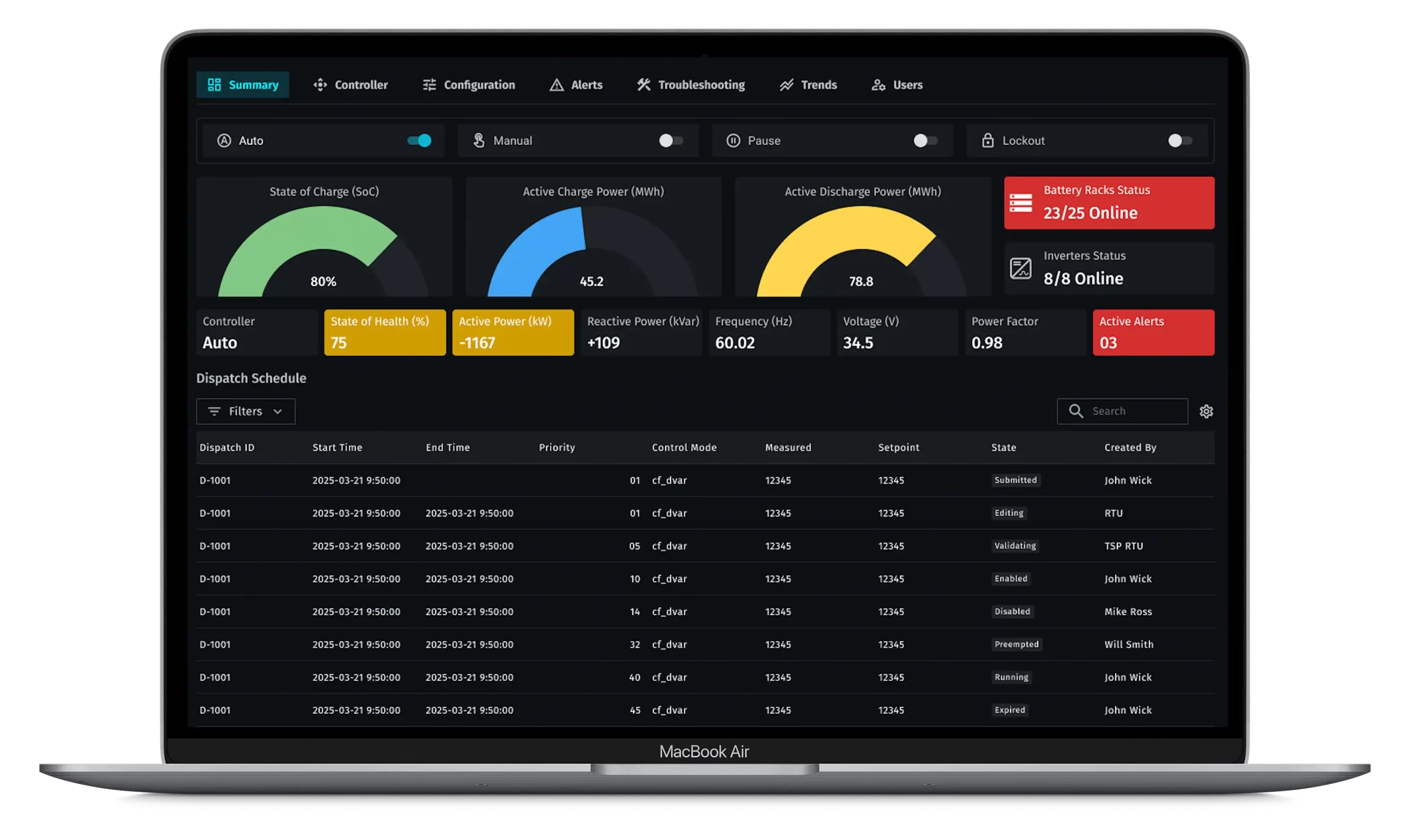Advanced supervision and control to optimize energy and financial performance


Choose from a dozen specialized control modes that help assets earn revenue from grid services – frequency response, voltage support, energy arbitrage, and more. Stack multiple revenue streams while meeting all grid requirements.
PowerTrack PPC implements active and reactive power control algorithms across multiple operating modes, coordinating command distribution to Power Conversion Systems (PCS) and PV inverters.
High-speed control options ensure compliance with complex interconnect standards globally, delivering rapid response for services including:

Designed for complex multi-mode applications to ensure continuous, dependable operation.
Provides synchronized control across all advanced modes for precise, integrated performance.
Manages inverters individually to handle challenging site topologies with ease.
Fully embedded within the PowerTrack EMS interface for seamless operation and unified control.
Executes control actions in less than a cycle to meet high-speed grid requirements.
| Category | Control Mode | Description | Market Application & Revenue |
|---|---|---|---|
| Frequency Management | |||
| Frequency Management | Fast Frequency Response (FFR)
FCR - Primary Frequency Control |
Reacts within milliseconds to grid frequency deviations, injecting or absorbing power to rapidly stabilize the grid during sudden changes | Enhanced interconnection terms and capacity payments NA: High-value FFR services and primary frequency response revenues EU: FCR market participation with premium pricing for fast response |
| Frequency Management | Frequency Watt Control
Primary Frequency Control or Frequency Response |
Automatically adjusts active power output based on grid frequency, modulating power to help restore balance and enhance grid resilience | Configurable response characteristics for optimal market participation NA: Frequency regulation and grid support service revenues EU: Primary frequency response markets and grid balancing service revenues |
| Frequency Management | Power Oscillation Damping | Detects and mitigates power system oscillations by dynamically adjusting power output, improving system reliability during transient events | Reduced curtailment risk through improved grid performance NA: Grid stability services and enhanced interconnection value EU: Grid stability compensation and service premiums |
| Voltage Management | |||
| Voltage Management | Automatic Voltage Regulation (AVR) | Maintains voltage levels within specified limits through continuous monitoring and reactive power adjustment at point of interconnection | Enhanced grid interconnection terms and capacity benefits NA: Voltage support services and reactive power compensation EU: Voltage control services and reactive power markets |
| Voltage Management | Volt-VAR Control
Reactive Power-Voltage Control or Q(U) Control |
Dynamically compensates for reactive power based on voltage levels, following predefined curves to maintain optimal voltage profiles | Improved power factor and reduced demand charges NA: Enhanced voltage support services and distribution compensation EU: Dynamic reactive power services and voltage quality premiums |
| Voltage Management | VAR Control
Reactive Power Control or Q Control |
Provides constant reactive power support to the grid, addressing known reactive power deficiencies at specific network locations | Long-term service agreements and predictable revenue streams NA: Steady reactive power compensation and grid support revenues EU: Reactive power market participation and grid service contracts |
| Power Management | |||
| Power Management | Active Power Limiting
Active Power Curtailment |
Caps active power output at specified levels, managing grid constraints and complying with interconnection agreements | Optimized interconnection capacity and reduced upgrade costs NA: Higher capacity factors through intelligent curtailment management EU: Constraint management services and congestion relief compensation |
| Power Management | Fixed Power Factor
Constant Cos φ Control |
Maintains constant power factor by balancing active and reactive power output to meet grid requirements and operational needs | Reduced penalties and improved operational efficiency NA: Power quality compliance and enhanced interconnection terms EU: Power quality services and grid code compliance benefits |
| Power Management | Dispatch Regulation Reserve
automatic Frequency Restoration Reserve (aFRR) - Secondary Frequency Control |
Participates in regulation services by following external dispatch signals, providing automatic frequency restoration capabilities | High-frequency trading opportunities and margin capture NA: Regulation market participation and real-time energy market access EU: aFRR market revenues through automated dispatch response |
| System Control | |||
| System Control | Dynamic SOC Control | Optimizes battery state of charge based on forecasted grid conditions, energy prices, and system constraints for upcoming events | Maximized asset utilization and revenue stacking opportunities NA: Multi-market revenue optimization across energy and ancillary services EU: Coordinated Day-Ahead, Intraday, and ancillary service participation |
| System Control | Automatic Generation Control (AGC)
manual Frequency Restoration Reserve (mFRR) - Tertiary Frequency Control |
Integrates with grid control systems by responding to AGC signals from system operators for grid balancing support | Grid operator preferred status and enhanced dispatch priority NA: AGC market participation and regulation service revenues EU: mFRR market access and tertiary control revenues |
| System Control | SOC Waypoint
SOC Scheduling |
Enables operators to set specific SOC targets at future times with automatic charge/discharge management to meet scheduled requirements | Reduced market penalties and improved bidding accuracy NA: Optimized positioning for scheduled energy delivery and commitments EU: Precise Day-Ahead commitments and scheduled grid services |